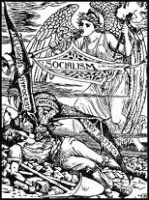The Paris Commune
4 posters
 The Paris Commune
The Paris Commune
I recently read Stewart Edwards' book "The Paris Commune 1871" which was published in 1971 in the wake of the large student uprisings of the 60s. It was very interesting to read about the issues of balancing organisation and spontaneity within the context of imperialist occupation and civil war, especially on streets I know quite well. It also dispelled some myths I had about the Commune. I am now convinced it was truly Communist rather than Anarchist in character, albeit bottom-up rather than Party-led Communism. I was also surprised at the huge role of that patriotism played in inspiring the Commune, combined with extremely radical social and economic demands. It was the anger and suffering caused by the government's capitulation to a foreign invader which drove the Parisien population to mobilise for their own defense and with hope of their eventual total liberation. The reason independent Communes did not form or if they did quickly fell in other French cities was because there was not there the deprivation caused by the siege and humiliation of foreign occupation to rally the people.

Entfremdung- ___________________________

- Tendency : Social Revolutionary
Posts : 78
Reputation : 53
Join date : 2013-06-14
Location : England
 Re: The Paris Commune
Re: The Paris Commune
I ultimately disagree with you on this.
The majority of the rank-and-file members of the Paris Commune were actually mutualists with the more elite revolutionaries being Blanquists. Thus, Anarchism did play a larger part. Hell, even 'top-down communism' played a larger part than bottom-up communism in form of the Blanquists. And, I think the reason is pretty obvious. Marx is German, Bakunin is Russian, but Proudhon and Blanqui are both Frenchmen that participated in the 2nd French Revolution of 1848.
While revanchism did play a somewhat large role in the Paris Commune and other communes (Yes, there were other cities revolting), the real reasons for their defeat was that they didn't form up a proper military fast enough, had practically no support in the countryside, didn't attack the Versailles fast enough, and revolted right after the Franco-Prussian War. Basically, the French government's soldiers were already mobilized for the slaughter.
Marx actually complained about the third reason, though I honestly can't see how you can't start elections and attack the Versailles at the same time.
Edit: Really, I don't even know if Blanqui wanted any form of communism or if he just wanted to destroy the capitalist system through a coup and doesn't care about what actually happens afterwards.
The majority of the rank-and-file members of the Paris Commune were actually mutualists with the more elite revolutionaries being Blanquists. Thus, Anarchism did play a larger part. Hell, even 'top-down communism' played a larger part than bottom-up communism in form of the Blanquists. And, I think the reason is pretty obvious. Marx is German, Bakunin is Russian, but Proudhon and Blanqui are both Frenchmen that participated in the 2nd French Revolution of 1848.
While revanchism did play a somewhat large role in the Paris Commune and other communes (Yes, there were other cities revolting), the real reasons for their defeat was that they didn't form up a proper military fast enough, had practically no support in the countryside, didn't attack the Versailles fast enough, and revolted right after the Franco-Prussian War. Basically, the French government's soldiers were already mobilized for the slaughter.
Marx actually complained about the third reason, though I honestly can't see how you can't start elections and attack the Versailles at the same time.
Edit: Really, I don't even know if Blanqui wanted any form of communism or if he just wanted to destroy the capitalist system through a coup and doesn't care about what actually happens afterwards.

Uberak- _________________________

- Tendency : Cantonalist
Posts : 129
Reputation : 65
Join date : 2013-02-24
Age : 28
 Re: The Paris Commune
Re: The Paris Commune
I realise Marx and the International played little part in the events of the Commune. It was perhaps disingenuous of me to say it was 'Communist' rather than 'Anarchist' as it really depends on the definition of these terms and where we draw the line between the two. Also there is a difference in the organisation of the Commune itself and of the National Guard.
Of course I agree with those reasons for why the Commune in Paris was defeated. If Paris had attacked and defeated Versailles and if the Communes in other cities had been stronger and better supported then perhaps a decentralised social-revolution would have succeeded in France.
Of course I agree with those reasons for why the Commune in Paris was defeated. If Paris had attacked and defeated Versailles and if the Communes in other cities had been stronger and better supported then perhaps a decentralised social-revolution would have succeeded in France.

Entfremdung- ___________________________

- Tendency : Social Revolutionary
Posts : 78
Reputation : 53
Join date : 2013-06-14
Location : England
 Re: The Paris Commune
Re: The Paris Commune
Entfremdung wrote:I am now convinced it was truly Communist rather than Anarchist in character, albeit bottom-up rather than Party-led Communism.
I have to echo Uberak's objection to this conclusion. The communeux failed to socialize the means of production and exchange during the Paris Commune's brief existence, which is a requisite condition for a revolutionary government to legitimately qualify as being communist. In Murray Bookchin's considered opinion, the class composition of the communeux being largely artisan helps explain why collectivization wasn't high on the Communal Council's list of priorities:
"To radical artisans, the most humane alternatives to the existing economy were still associations—cooperatives—whether owned and managed by a sizable number of factory workers or by cooperatives of craftspeople in small privately owned workshops. At most, the Commune might have evolved toward fostering cooperatives more aggressively. But as we have seen, any notion of the ownership and control of the means of production even by the municipality as a whole, still less the nationalization of property, was far from the minds of the majority of delegates. The Commune either ignored or eschewed the need to create a society in which private ownership, the market, and even profit would be replaced by the social ownership of the means of production and the distribution of goods according to needs—in short, a communistic society."
Murray Bookchin, The Third Revolution: Popular Movements in the Revolutionary Era, Vol. II (London: Cassell, 1998), p. 235.
Such is also why historians like Bookchin refer to the political philosophy which animated the Commune as "artisanal socialism." That isn't to say that communists didn't admire the Commune. Indeed, Friedrich Engels even went so far as to use it as an example of the dictatorship of the proletariat he and Marx envisaged overtaking Europe one day:
"Of late the Social Democratic philistine has once more been filled with wholesome terror at the words: Dictatorship of the Proletariat. Well and good, gentlemen, do you want to know what this dictatorship looks like? Look at the Paris Commune. That was the Dictatorship of the Proletariat."
Friedrich Engels's introduction of 1891 to a new edition of Karl Marx, The Civil War in France (Moscow: Foreign Languages Publishing House, 1962), p. 22.
I was also surprised at the huge role of that patriotism played in inspiring the Commune, combined with extremely radical social and economic demands. It was the anger and suffering caused by the government's capitulation to a foreign invader which drove the Parisien population to mobilise for their own defense and with hope of their eventual total liberation.
This is a crucial point of which contemporary leftists are seldom aware. Part of the problem, in my opinion, is the despicable manner by which cosmopolitan historians (e.g., Donny Gluckstein) intentionally omit mention of the significant role left-wing nationalism played in the formation of the Commune—particularly among the National Guard. Victor Henri Rochefort, who had met with the Parisian revolutionaries, described the Commune as having been "both socialist and patriotic" [“Inquiry on the Commune,” La Revue Blanche, 1897]. Jules François Alexandre Joffrin further explained the distinctly left-wing nature of the communeux's nationalism by insisting that their "chauvinism was not a patriotism that would make conquests," but rather a "revolutionary patriotism" which developed out of their viewing the French Revolution as having been the defining moment of their "great fatherland" [Joffrin quoted in Jean T. Joughin, The Paris Commune in French Politics, 1871-1880; the History of the Amnesty of 1880 (New York: Russell & Russell Publishing, 1973), p. 371].
Uberak wrote:The majority of the rank-and-file members of the Paris Commune were actually mutualists with the more elite revolutionaries being Blanquists.
Not to be pedantic, but while Proudhonists represented a considerable segment of the Commune's delegates, neo-Jacobins were probably the largest faction. Blanquists were in the minority.
Really, I don't even know if Blanqui wanted any form of communism or if he just wanted to destroy the capitalist system through a coup and doesn't care about what actually happens afterwards.
Blanquism is definitely more characterized by its conspiratorial theory of revolution than it is by any economic programme. However, Louis Auguste Blanqui's short essay “Who Makes the Soup Should Eat It” (1834) should suffice to dispel the notion that he wasn't concerned with achieving a communist alternative to capitalism.
 Re: The Paris Commune
Re: The Paris Commune
Lenin's article "Lessons of the Commune" is a good read about why the commune fell.
"But two mistakes destroyed the fruits of the splendid victory. The proletariat stopped half-way: instead of setting about “expropriating the expropriators”, it allowed itself to be led astray by dreams of establishing a higher justice in the country united by a common national task; such institutions as the banks, for example, were not taken over, and Proudhonist theories about a “just exchange”, etc., still prevailed among the socialists. The second mistake was excessive magnanimity on the part of the proletariat: instead of destroying its enemies it sought to exert moral influence on them; it underestimated the significance of direct military operations in civil war, and instead of launching a resolute offensive against Versailles that would have crowned its victory in Paris, it tarried and gave the Versailles government time to gather the dark forces and prepare for the blood-soaked week of May."
https://www.marxists.org/archive/lenin/works/1908/mar/23.htm
"But two mistakes destroyed the fruits of the splendid victory. The proletariat stopped half-way: instead of setting about “expropriating the expropriators”, it allowed itself to be led astray by dreams of establishing a higher justice in the country united by a common national task; such institutions as the banks, for example, were not taken over, and Proudhonist theories about a “just exchange”, etc., still prevailed among the socialists. The second mistake was excessive magnanimity on the part of the proletariat: instead of destroying its enemies it sought to exert moral influence on them; it underestimated the significance of direct military operations in civil war, and instead of launching a resolute offensive against Versailles that would have crowned its victory in Paris, it tarried and gave the Versailles government time to gather the dark forces and prepare for the blood-soaked week of May."
https://www.marxists.org/archive/lenin/works/1908/mar/23.htm

slavicsocialist- ___________________________

- Tendency : Marxist Leninism
Posts : 28
Reputation : 10
Join date : 2014-01-09
 Re: The Paris Commune
Re: The Paris Commune
Our own 'Lessons Of The Commune' from a libertarian, mutualist, patriotic perspective:
http://autonomous-england.blogspot.co.uk/2014/11/the-commune.html
http://autonomous-england.blogspot.co.uk/2014/11/the-commune.html

Entfremdung- ___________________________

- Tendency : Social Revolutionary
Posts : 78
Reputation : 53
Join date : 2013-06-14
Location : England
Permissions in this forum:
You cannot reply to topics in this forum





